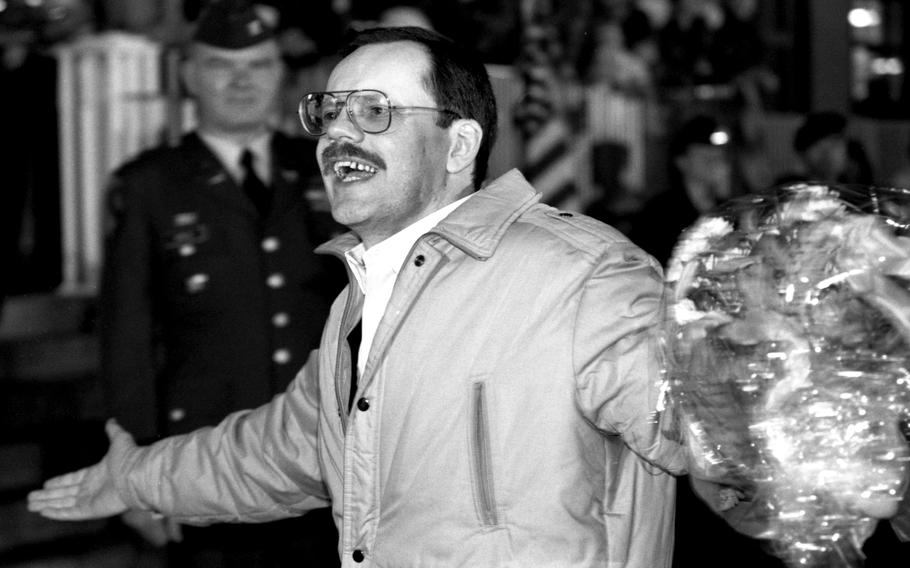
Wiesbaden, Germany, December 5, 1991: Associated Press correspondent Terry Anderson, held captive in Lebanon for 6½ years, acknowledges the cheers of the crowd that greeted him at the Wiesbaden Air Force hospital in Wiesbaden, Germany, Dec. 5, 1991, after his release. (Michael Abrams/Stars and Stripes)
Terry Anderson, a former Associated Press journalist who was held hostage by Hezbollah for nearly seven years, died at his home in Greenwood Lake, N.Y., on Saturday. He was 76.
His daughter Sulome Anderson told The Washington Post that he recently had heart surgery, though she could not confirm the cause of his death.
Anderson was abducted in Beirut on March 16, 1985, after playing tennis with an AP colleague. Islamist militants held him for more than six years — as part of an operation to negotiate prisoner swaps — an ordeal he survived in part due to “stubbornness.”
“You wake up every day. You summon up energy from somewhere. I don’t know how,” Anderson said shortly after his release, according to a 1991 Post story.
He was among more than a dozen Americans kidnapped in Lebanon in the 1980s, but he was held captive the longest, The Post reported. Anderson described being beaten and chained, enduring months of silence and years without sunlight.
“He was one of the bravest and toughest people that I’ve ever known,” said Bob Reid, 76, who served as the AP’s Cairo Bureau chief while Anderson was leading the Beirut bureau in the 1980s.
The men often worked alongside each other, chronicling the Middle East’s tumult, Reid told The Post.
“When he was kidnapped, we were obviously concerned, but we also thought if there’s anyone who can survive this, it’ll be Terry for sure.”
Anderson enlisted in the Marines after high school, rising to the rank of staff sergeant during the Vietnam War, the AP reported. His military experience was a point of pride, Reid said, and in part what granted Anderson the strength to endure his kidnapping.
“He had a strong personal moral compass,” said Reid, who is now the editor in chief of Stars and Stripes. “He always seemed to exude a certain self-confidence. He didn’t panic.”
Running the AP’s Beirut bureau was a “complicated operation,” Reid recalled.
“I remember one night sitting around the office, and we heard these horrific explosions coming from Terry’s neighborhood,” he said. Anderson bolted to his home, relocating his then-wife, daughter and father to a hotel closer to the newsroom.
A round of shelling hit the hotel. Again, Anderson evacuated his family to safety.
Then he came back to work, Reid said.
It wasn’t all hardship, Reid recalled. There were good times, too.
“We used to go over to his apartment and sit out in the evening on his balcony, sip his scotch, smoke his cigars, feeling the mist of the ocean blowing into our faces,” Reid said.
Later, when the AP offered to move Anderson to Cyprus, “where a lot of international media had moved,” Reid said, Anderson refused and insisted on remaining in Beirut. “Terry just felt that while it was risky, it was also necessary to keep a presence there.”
Then Anderson was kidnapped after a Saturday morning game of tennis with an AP photographer.
He would endure more than six years of torture. Still, Anderson persevered, often passing time by debating politics with his captors, The Post reported.
Shortly before Iran brokered his December 1991 release, Anderson joked with his jailers, as well.
“I said, ‘Mahmound, listen to this, I’m not here. I’m gone, babes. I’m on my way to Damascus.’ And we both laughed,” he told Giovanna Dell’Orto, author of “AP Foreign Correspondents in Action: World War II to the Present.”
Two years after his release, Anderson published “Den of Lions: Memoirs of Seven Years,” chronicling his experience as a hostage.
In 2000, a U.S. judge ordered the Iranian government to give Anderson $324 million, saying Iran was behind his kidnapping. It also said Tehran must give his wife, Madeleine Bassil, $10 million and his daughter Sulome Anderson $6.7 million. Anderson collected about $26 million, according to the New York Times, before filing for bankruptcy in 2009.
He went on to open restaurants, teach journalism and speak publicly about suffering from post-traumatic stress.
“We were all damaged, in some ways, you can’t help it, after that kind of an experience,” he said in an interview with the Bob Graham Center for Public Service.
In 2004, Anderson unsuccessfully ran for the Ohio state Senate.
In a message after her father’s death, Sulome Anderson noted his charitable work.
“Though my father’s life was marked by extreme suffering during his time as a hostage in captivity, he found a quiet, comfortable peace in recent years,” she told The Post in an email Sunday afternoon. “I know he would choose to be remembered not by his very worst experience, but through his humanitarian work with the Vietnam Children’s Fund, the Committee to Protect Journalists, homeless veterans and many other incredible causes.”
She said the family would announce plans for a memorial service.
Anderson is survived by his daughters Sulome and Gabrielle, Bassil, two other ex-wives, his sister Judy, and his brother Jack. His sister Peggy Say, a public advocate for his release, died in 2015.
Reid remembered that despite his colleague’s ordeal, Anderson didn’t seem too changed after his release.
“I saw him on television, I just thought that it was the same old Anderson,” Reid said. “I won’t say he suffered no effects, like many cases of traumatic experiences like that, it takes time to develop.”
But in that brief moment, Anderson remained composed. He knew what to say, like always, Reid said.
“His contribution, more than any individual story, was just keeping the train on the rails. And that’s not something to discount,” Reid said. “That’s an enormous part of any job like that or any mission. And that’s what I’ll remember Terry for: not so much for the writing and the reporting, as it was the leadership.”